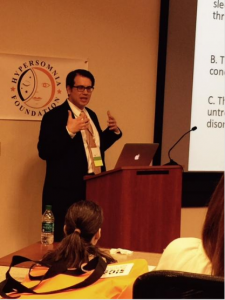SomnusNooze
Narcolepsy vs Idiopathic Hypersomnia: What’s the Difference?
My 9-year-old son recently was diagnosed with IH but can’t exclude narcolepsy. We got a second opinion and the doctor agreed. I don’t understand why they don’t have a definitive answer. The doctors told me to not to worry about narcolepsy vs. hypersomnia. Can anyone help me understand the difference? And is it possible to have IH and beginning stages of narcolepsy?

Both narcolepsy and idiopathic hypersomnia (IH) are considered central disorders of hypersomnolence (CDH). They share similarities, most important of which is the requirement that patients with both disorders must experience significant excessive daytime sleepiness. From a diagnostic standpoint, sleep medicine uses the multiple sleep latency test (MSLT), a repeated nap study performed after polysomnography (PSG; an overnight sleep test), to help identify and characterize central disorders of hypersomnolence. One of the primary results of these tests used to determine whether a patient has narcolepsy or IH is based on the number of sleep onset REM periods (SOREMPs), during which individuals go into REM sleep much faster than is typical. Patients with narcolepsy have 2 or more SOREMPs on PSG/MSLT testing, whereas patients with IH do not.
There are differences in other clinical symptoms experienced by patients that can be used to help clarify whether a person has narcolepsy or IH. For example, patients with IH often sleep excessive amounts of time and have severe difficulty waking up after sleeping (i.e. excessive sleep inertia). Patients with narcolepsy frequently do not sleep excessive amounts of time, and may find brief naps refreshing. Many patients with narcolepsy also experience symptoms related to REM sleep instability such as sleep paralysis (waking from sleep in a paralyzed state) and hallucinations around sleep onset/offset, thought to be due to inappropriate combinations of REM sleep and waking brain function (these are called hypnagogic or hypnopompic hallucinations). In addition, some patients with narcolepsy experience cataplexy, the sudden loss of muscle tone in response to emotions such as laughter. Cataplexy is almost never seen outside of narcolepsy, and thus when patients have this symptom, there is high suspicion that the patient does indeed have narcolepsy.
Sometimes, the clinical history and results of PSG/MSLT testing do not neatly align. Although I do not have the specifics in the case of your son to comment definitively, it is certainly possible that the results of his sleep testing have shown he is pathologically sleepy consistent with IH, but did not have enough SOREMPs to be diagnosed with narcolepsy. He may also have clinical symptoms that are more suggestive of a narcolepsy diagnosis than IH, which is why there is some ambiguity around the diagnosis. Sometimes retesting can help clarify the diagnosis, but not always. Because initial treatment of both narcolepsy and IH often involves stimulants, oftentimes treatment is initiated for practical reasons to try to improve the patient’s symptoms, since the precise diagnosis may not alter initial clinical management, particularly in the early stages of treatment.
David T. Plante, M.D.
Assistant Professor, Department of Psychiatry
Program Director, Sleep Medicine Fellowship
University of Wisconsin School of Medicine and Public Health
Disclaimer for Ask The Doctor: The medical information provided is meant for educational purposes only and not as a substitute for professional medical care or advice. Questions about a personal health condition should be discussed with your healthcare professional.
